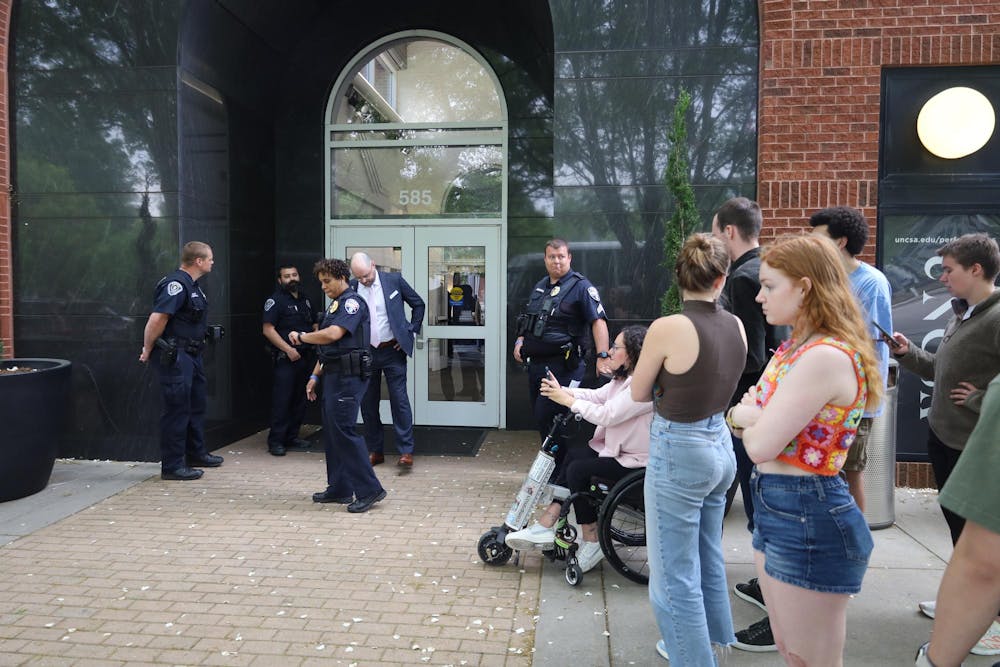“I just think the presence of students at BOG, BOT meetings — making sure that there is physical, visible signs of resistance to their harmful policies — is really important at this moment in time,” Scott said.
Scott joined a group of 10 students who attempted to attend Wednesday’s meeting. Among the students were Denza and Samuel Scarborough, SSAC organizer and UNC first-year student.
Denza said the group had no intent to protest.
In a video obtained by The Daily Tar Heel, Director of University Public Safety Operations & Clery Act Training Edward Purchase can be seen standing in front of the entrance to the public meeting space, along with at least five visible police officers.
Purchase, who did not respond to The DTH’s request for comment by the time of publication, can be heard telling the students that the three seats available to the public were all full, along with the gallery for chancellors and their invited guests.
“To me, it's alarming because it was an open meeting that impacts 17 institutions and there were three seats for the public," Scott said. "That's not even a one to one — not even close to a one-to-one ratio of institutions."
The complaint also states the students were not allowed to set foot within the building.
One student, who is a wheelchair user, was barred from entry despite not needing a physical seat and not even allowed to use the bathroom, Scarborough said, until UNCSA students let them in.
Scarborough said issues with parking availability, timing of the meeting materials being published and being denied entry into the building all contributed to the inaccessibility of the meeting. He also said the "heavy police presence" made the meeting feel unwelcoming to the public.
“It doesn't create an atmosphere that feels safe for students to go, for concerned parents to go to or for concerned professors to go to,” he said.
According to a statement from the UNC System Director of Media Relations Andy Wallace, seats at BOG meetings are reserved for the media, as well as chancellors, campus staff, UNC System staff, PBS North Carolina technical staff and the board itself.
No UNC System policy mandates the amount of seating that has to be accessible to the public.
To get the day's news and headlines in your inbox each morning, sign up for our email newsletters.
"Any open seats are available to the general public on a first-come, first-served basis,” he said.
Wallace also said in his statement that all UNC BOG committee and full board meetings are live streamed and publicly accessible on PBS North Carolina.
'The fix was in'
The “total exclusion” of the students, as listed in the complaint, raised concerns about the accessibility and openness of Board meetings.
“This action by Purchase and other involved personnel suggests a deliberate effort to limit public scrutiny and attention on a meeting that involved significant policy decisions affecting the student body and the broader university community,” the complaint stated.
Stevens Martin Vaughn & Tadych Attorney Hugh Stevens said in a statement that he does not think the denial of student entry occurred out of “nefarious motive,” but rather a mixture of time and place of the meeting along with unanticipated circumstances.
If a violation did occur, Stevens said, he thinks it was highly technical. The larger concern, he said, is why the committee had no public debate or discussion of such an important and controversial issue.
“The committee’s perfunctory vote strongly suggests to me that ‘the fix was in,’” Stevens said.
The final tenet of SSAC’s complaint argued that the BOG anticipated a large public reaction to the complaint and chose to diminish backlash through private deliberation.
“The truth of this is the reason that this was done in basically secret — we can say that it was done in secret — is because it's a wildly unpopular change within the university system,” Denza said.
If the University's governing bodies are going to emphasize civic engagement, then they need to create opportunities for students to do so, Scarborough said.
The meeting’s lack of deliberation and accessibility, compounded with the fact that there is only one student on the BOG which serves over 240,000 students, signaled to Scarborough that the BOG does not actually want to hear student voices at meetings.
“That is especially damning, especially alarming, because we, as students, many of us are from in state and are taxpayers to these public institutions and students are paying tuition for these institutions to run,” he said.
'A swarm is terrifying'
The complaint called for the results of Wednesday’s meeting to be made “null and void” in accordance with North Carolina General Statute 143-318.16A.
The statute declares that any action of public bodies violating the Meetings of Public Bodies article should be annulled within 45 days of the initial disclosure of any suit.
Jaeda Wagner, SSAC organizer and UNC senior, said most students would not have questioned Wednesday's events as violating North Carolina’s public meetings law, but the hope of the complaint is to set a precedent.
Denza said that at the time of publication, the SSAC had yet to hear from any BOG members or A.G. Josh Stein’s office.
The BOG has mastered incrementalism, Scott said, and no matter how minor or regressive a change may seem, each step requires attention.
She said if students enjoy sitting in the Sonja Haynes Stone Center for Black History and Culture, the existence of UNC’s LGBTQ Center or if they have ever found a home in any identity-based group on campus, they need to be paying attention because those centers will be losing support. Students, she said, need to keep showing up.
“One bee is annoying,” she said. “A swarm is terrifying.”
@l_rhodsie
@dailytarheel | university@dailytarheel.com
Lauren RhodesLauren Rhodes was the 2024 university editor at The Daily Tar Heel. She previously served as an assistant editor and senior writer for the university desk.




